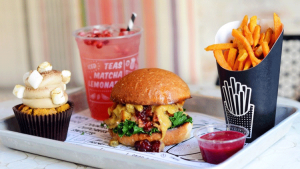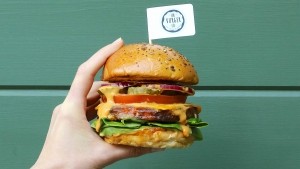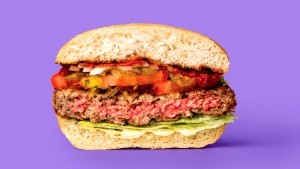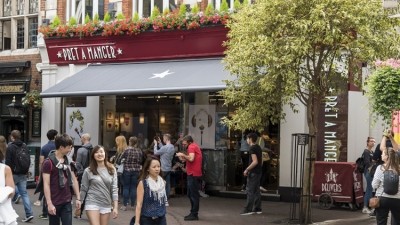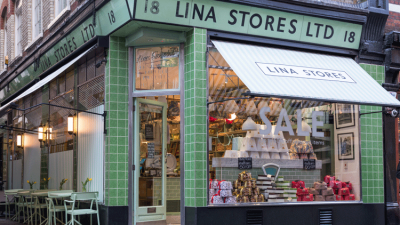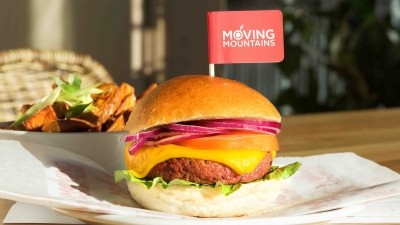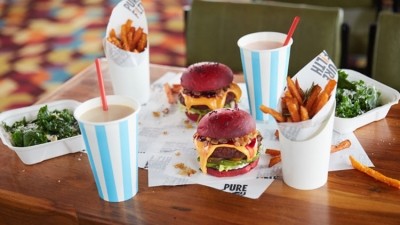"The Green Party"- is meat-free finally going mainstream?
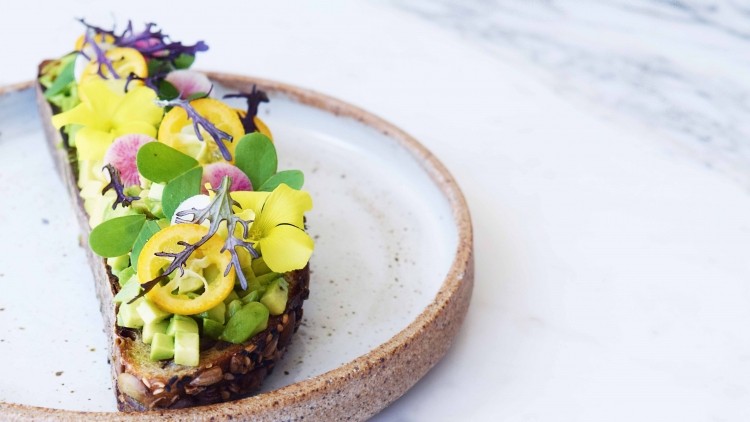
It’s 8pm in Hackney Central, and a queue of jostling adolescents, cans in hands, crowd the street. Perhaps a few years ago they might have been a drunk, hostile overspill from a neighbouring pub – today, they’re vegans, queuing patiently for Temple of Seitan, the world’s first vegan fried chicken shop.
This isn’t just an east London phenomenon, either. According to statistics from The Vegan Society, there are now at least 542,000 vegans in the UK; 10 years ago, that figure was only around 150,000. That’s a 260% increase, even without counting the 11% of Britons who try to follow the diet without claiming to be fully vegan, according to research company Mintel.
Moreover, this new movement of veganism is being driven by younger members of society. Almost half of vegans are aged 15-34 (42%), compared with just 14% who are over 65, data from Ipsos Mori shows, and a recent study on vegans by The Guardian found 67% of those who replied to the survey were under 34.
It should come as no surprise, therefore, that a new wave of pioneering vegan restaurant formats and events have sprung up across the country to satisfy the appetite for plant-based foods. The militant ‘mung bean brigade’ of old is being replaced with a cooler, more contemporary vegan consumer, who is choosing Kentucky fried ‘seitan nuggets’ over mushy tofu steaks and Korean fried jackfruit baos over tired vegetable curries. Indeed, August saw vegan street food market ‘Living on the Vedge’ hosted by street-food stalwart Kerb in King’s Cross clash with London’s Fat Gay Vegan’s Hackney Downs Vegan Market – the only issue the two events had in common (besides the awkward clash) was that too many people turned up.
Veganism is by no means a new pocket of the restaurant scene. Manna, in Primrose Hill, said to be London’s oldest vegetarian/vegan restaurant, will celebrate its 50th anniversary this month. Similarly, Food for Friends and Terre à Terre in Brighton, have long played a key part in the coastal city’s food eating scene.
The move into the mainstream
The past few years, however, have seen a shift away from the stereotypical approach to plant-based eating. Sean O’Callaghan, blogger, author of Fat Gay Vegan: How to Eat, Drink and Live Like You Give a Sh!t and prominent voice in the UK vegan scene, says that as consumer demand for plant-based foods has increased, bigger companies have adapted to accommodate vegan lifestyles.
“When consumers want something, that’s when businesses respond,” he says, referencing Italian chain restaurant Zizzi, which has rolled out extensive vegan menus and wine lists across its estate. “That was a big undertaking for a non-vegan restaurant and it’s all been driven by people saying they want it. The business-savvy follow the money, which is why [the restaurant chains] are investing in developing vegan offerings. They know money comes in when they do it.”
Another recent example of a large chain going green is Pret a Manger. In July 2015, when Pret CEO Clive Schlee looked at the restaurant sales mix, he found that the best-selling SuperBowl salad was the chain’s ‘Beets, Squash and Feta’ option. The salad outsold chicken, salmon and crayfish alternatives – something that would have been unheard of five years ago – and, after a succession of market research trials, a stand-alone, fully vegetarian Veggie Pret in Soho was born.
This isn’t to say that the majority of Pret’s patrons are vegetarian. In fact, after research, Schlee found that more than half of the customers in the Veggie Pret shops were meat eaters. Yet in the regular stores, plant-based options like turmeric cauliflower with sweet potato falafel were continuing to out-sell meat-based ones. Schlee had expected sales in the meat-free store to drop, but even after the initial enthusiasm and buzz surrounding the first few weeks of opening, sales at the Veggie Pret have continued to be above where they were before its conversion, prompting the company to open a second one in Shoreditch in April this year.
Pret’s success in this area has not gone unnoticed by key players in the US vegan scene, which have started opening their own outposts in the newly receptive UK restaurant market in the past couple of months. Most notable are By Chloe, New York’s uber-trendy vegan restaurant, and Essence Cuisine in Shoreditch, with a menu designed by celebrity chef Matthew Kenney. A common factor in both of these restaurants it that although they only sell vegan food, they both clearly identify as ‘healthy-eating’ options – a quality that carnivores, vegetarian and vegan consumers alike are increasingly looking for when choosing a restaurant.
“The market has become much more focused on the health and quality of food that guests are receiving. Convenience is still such a priority for diners but, more than that, they want to eat food that is delicious but also good for overall health,” says By Chloe CEO Samantha Wasser.
“We’ve seen new vegan concepts open up, but we are also seeing existing restaurants adapt and change to offer more vegan-friendly options on their menus. The way people eat has changed and the knowledge and interest people have in knowing what they are eating and why it’s good for them has evolved significantly in the same vein.”
This trend is being borne out in the supermarkets. Tesco has found that demand for vegan and vegetarian products has grown 40% in the past year alone, and the supermarket has responded by announcing plans to roll out a new vegan logo across its own brand range. It wasn’t the only supermarket to get in on the action; Sainsbury’s was the first to create vegan lasagnes, and recently scored another first with its vegan pizzas.
Sainsbury’s also reports that sales of its frozen meat-free products are up by 25% on last year. And, besides the faux-meat, frozen food demand hike, sales of lentils are up by 18%, chickpeas by 14% and people can’t get enough of canned pulses such as kidney beans and black beans, with sales of the latter rising 39% in the past 12 months in the supermarket. This suggests that people are not just aiming to avoid meat, but are taking a greater interest in eating healthy foods.
“I don’t like the word vegan”, says Bart Roman, the Belgian entrepreneur, festival organiser, nightlife expert and founder of Essence Cuisine.
“For us, we’re more about health and morals. Junk food is junk food, whether it’s vegan or not. It’s got refined sugar, bad carbohydrates, it’s junk and it’s not good for the body. The mission statement of our company is to bring incredibly tasty food to a cool setting that’s also healthy… and then we say it’s plant-based. That’s the way we think.”
Social media’s growing role
As is the case with the majority of food trends these days, social media and the internet have played significant roles in the new impetus for restaurants to cater towards those who eschew animal products. Google Trends has seen a 90% increase in searches containing the word ‘vegan’, whereas searches for other diet-related trends (paleo, gluten-free, 5:2 and sugar-free) are hardly changed at all, clearly demonstrating that veganism is thriving in online communities.
King Cook, the Thai chef and owner of the Cook Daily vegan restaurant brand, has recently expanded the Shoreditch site of his vegan restaurant, as well as opening a second location in Croydon. The restaurant majors in serving various vegetable dishes accompanied by brown rice, including the Full English, made with tofu scrambled ‘egg’, mushrooms, tomatoes, greens, vegetarian sausages and house brown sauce.
With a celebrity following from the UK music scene, Cook’s Instagram posts garner thousands of likes and reposts online, attracting a new demographic and introducing them to a new lifestyle.
“All it takes is JME (a UK rapper from grime crew Boy Better Know, and brother of Mercury Prize winner Skepta) to tweet and say ‘I’m at Cook Daily’ and I’ve got 50 young boys in here,” he says. “They think vegan means white, middle class, but I hope I challenge that. It’s just about making them know: bruv, I wasn’t born vegan, I don’t really know anyone that was born vegan. We’re in the same boat.”
Cook Daily’s appeal outside of the allure of celebrity is that it normalises what has previously been considered an overly worthy, hippy-focused option, or ultra-trendy and overpriced. YouTube, Instagram and even a wealth of TV shows have brought veganism to the fore as something ‘cool’ and inclusive rather than something that is weird.
While many UK-based vegan companies are experiencing modest growth and success, plant-based burger company Vurger Co has gained publicity for smashing its crowdfunding target of £180,000 by 66% for its first bricks-and-mortar restaurant.
The restaurant reached its target within just 30 hours, making it the fastest to do so on crowdfunding platform Crowdcube.
Founders Rachel Hugh and Neil Potts have been forced to raise their equity offer to 33.33% to accommodate their surprise success.
“Last year, when we started to look for vegan options, even saying the word ‘vegan’ in some restaurants was absurd – people didn’t know what we were talking about,” says Hugh.
“Social media has been a huge help in normalising what it is to be vegan and what it is to eat a plant-based diet. Seeing people eating that way and realising that it’s not that weird or strange means people understand that you can just incorporate that into your daily life. That really helped us.”
Vurger’s mission to ‘revolutionise fast food forever through the power of plants’, clearly struck a chord with its backers. The company has taken its cues from popular burger chains and has a four-strong option that includes its signature burger of smoky black beans with peppers and corn topped with tomato, red onion and Vurger sauce; and the Auburger – a chipotle smoky aubergine, red onion and chickpea patty topped with cumin mayo and pickled cabbage. Sides include truffle mac ’n’ cheese and skin-on chips.
O’Callaghan puts the company’s crowdfunding success down to the larger chains’ changing opinion towards vegan and plant-based companies. The blogger, who has closely studied the plant-based restaurant scene since long before its recent transition says that, today, a vegan company is seen “not as a risk, but a sure-fire money spinner”.
“Investors are seeing that there’s a return,” he says. “They’re seeing that this is a trend that’s been growing year on year for the past five years. So when people are crowdfunding, it’s not actually that hard a sell anymore. It’s a way to get in close to the ground floor with an investment opportunity that still has the sky as its limit.”
The challenges of meat-free
In the face of rising meat, fish and dairy prices, there’s an increasingly strong business sense for a restaurant to focus more on vegetables. As well as being cheaper, vegetable dishes can offer good margins, with consumers willing to pay similar prices for non-meat dishes as they would for those containing meat (Vurger’s burgers are all £7.95, and customers can double up to two patties for an extra £3).
It would follow, therefore, that vegan or plant-based restaurants should be turning an easy profit but the plant-based restaurant model throws up other problems.
“Plates are usually divided into three parts – the grains or pasta, the vegetables, and then the meat,” says Essence Cuisine’s Roman. “We skip the meat or fish, which is traditionally the most important thing on the plate. On a food-cost level, our business model is way easier but we need to invest a lot more hours into preparing the food. It’s more complicated on a business scale than a traditional restaurant.”
This sentiment is echoed at By Chloe, where founder Samantha Wasser says that although they might save costs by not buying meat or dairy, they do have to buy “a lot of ingredients, for a substantial menu”.
“It becomes less about the difference between vegan and non-vegan and more about the quality of ingredients you are using to create your menu, which is something we won’t sacrifice,” she says.
As meat prices continue to climb, the rise in non-meat concepts suggests that the industry, whether motivated by social trends or by financial interest, is starting to take plant-based, ethical businesses more seriously than ever before.
And, with factors such as the growing global population, climate change and supply chain stress coming increasingly into the spotlight, more entrepreneurs are likely to latch onto the vegan movement as a way of finding solutions to these issue.
“These are venture-scale problems with venture-scale returns,” says Randy Komisar, a partner at Perkins Caulfield Byers, a venture capital firm that backs Google, Facebook, and Beyond Meat – a US-based company that invented the famous Beyond Burger, another plant-based burger that mimics beef.
“Frankly, we’ve never said we’re interested in food. What we’re interested in is big problems needing solutions, because they represent big potential markets and strong opportunities for building great returns.”
With the impetus on healthy living further driving the mainstream away from the traditional animal-centric diet, it seems increasingly likely that the future of restaurants could be green.
This time next year there could be crowds of jostling adolescents queuing patiently outside vegan restaurants across the country.
Mission possible: the making of a meat-free icon
Given the massive spike in popularity of burgers over the past few years, you’d be forgiven for thinking that the most famous of them all would be a four-patty behemoth of wagyu beef or such like – the kind that can be found dripping and oozing on Instagram accounts across the world.
And yet it isn’t. In fact the most remarkable burger to be created in recent years is one that doesn’t contain any meat at all – although at first look (and indeed bite, according to its maker) you’d be hard-pressed to know. And it’s called the Impossible Burger.
Created by start-up Impossible Foods, the meatless, ‘bleeding’ burger has been created as part of the company’s mission to transform the global food system to support the planet and growing human population. It looks scarily like meat, has the texture of meat and even ‘bleeds’ like meat and is made from ingredients including wheat, coconut oil, potatoes and heme. The latter is abundant in animal muscle and is said to be a basic building block of life in all organisms, including plants, and contributes to the colour and taste of meat. Impossible Foods takes heme from plants and ferments it before adding it to the patty.
It might not be to everyone’s tastes, but the Impossible Burger and the funding Impossible Foods has raised for its endeavours – believed to be in excess of $250m (£185m) from investors including Bill Gates – shows the appetite for vegan food goes well beyond traditional food trends. While the burger is currently only available in the US, it seems only a matter of time before consumers will be sinking their teeth into it over here.
This is a web version of an article that first appeared in the October issue of Restaurant magazine, the leading title for the UK's restaurant industry. For more features, comment, interviews and in-depth analysis of the restaurant sector subscribe to Restaurant magazine here.
